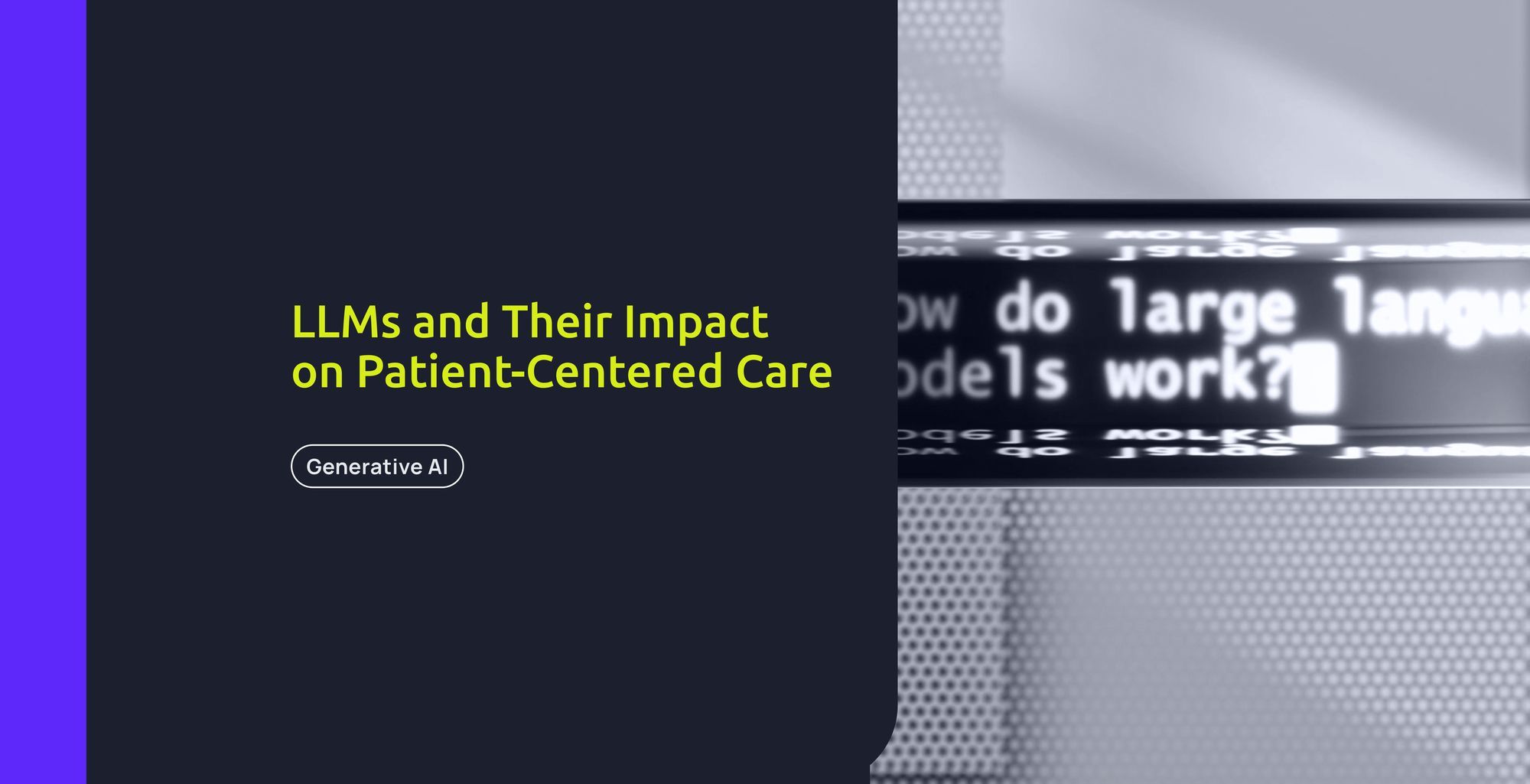Let’s start from the beginning. In simple words, Large Language Models, or LLMs, are a type of AI that can mimic human intelligence, letting you interact with them as you would with a real person. LLMs are now a hotspot in multiple sectors as they bring value to every industry, and health is not an outsider.
Medical Large Language Models can understand intricate medical texts, extract pertinent information, and produce insightful materials for patients and healthcare professionals. With appropriate training and supervision, they improve experiences, making processes more efficient and saving costs.
The increasing availability of medical data
The expansion of medical data availability is another factor to take into account. LLMs are trained on massive datasets of text, code, and documents. The healthcare industry generates more data than ever, enabling more thorough and exact training for Health LLMs.
LLMs use cases in health
In this article, I'll display four use cases of how they can be applied to digital health products to improve both patient experience and reduce the burden on medical staff and their processes.

Mental Health Companions
People seeking psychological support may feel more comfortable interacting with digital assistants in a private, safe, and accessible context. Virtual mental health companions can allow individuals to express their feelings and emotions openly without feeling judged.
What’s the main significance of AI Health Companions?
- LLMs can mimic empathy: You can really feel like someone is listening to you and providing valuable insights based on what you tell them.
- Lack of judgment: Because they are a machine, they won’t judge. People may feel they can open up more about their feelings when they talk to a computer or a machine instead of talking to a real person.
- Availability 24/7: Virtual mental health companions are advantageous due to their round-the-clock accessibility, ensuring continuous support and aid for those seeking help. You may not message your therapist on a Tuesday at 3 AM, but you can do it with a virtual health companion anytime, guiltlessly. This is a valuable complementary tool to integrate into conventional psychological therapy.
SERMO is a conversational tool that applies methods from Cognitive Behaviour Therapy (CBT) to guide patients with mental health conditions to regulate their emotions and have greater control of negative thoughts. It automatically detects the type of emotion based on user text inputs and recommends wellness activities or custom-tailored exercises to address specific emotions.
Health Coaches
AI health coaches can guide a patient while undergoing a specific pathology and treatment to make sure they follow the plan as it's meant to.
What are the most interesting aspects of an AI Health Coach?
- Data analytics: They have the ability to analyze patients' data based on their historical records and real-time symptoms while understanding different medical conditions in-depth.
- Treatment adherence: They can employ behavior change techniques and motivational strategies to help patients stick to treatment, enhance medication adherence, adopt healthier habits, and maintain them over time. Medication compliance is a key issue affecting treatment efficacy and is frequently linked to forgetfulness and inadequate patient understanding. So, this application improves not only the patient's experience but also the treatment outcome.
InteliHealth, uses Medical LLMs to create personalized health plans for individuals with obesity. Patients can use the InteliHealth to answer questions about their health and lifestyle. The LLM will then generate a customized plan that includes diet, exercise, and medication recommendations.
Educational Assistants:
LLMs can create personalized learning experiences for prospects in an exploration phase. After complex and unexpected medical diagnoses, they can also create educational resources for patients and their families. Engaging users through education initiatives may boost compliance and encourage patients to be responsible for their health.
- Custom-tailored training: A healthcare company can provide its very own sources of information to train its AI assistants. Moreover, in the context of an ever-growing library of medical data, they are constantly provided with information on specific conditions and treatment research by trusted academics, government, and industry experts.
- Immediate customer service: It’s no longer necessary to go through the bureaucratic process of scheduling medical appointments and attending consultations to evacuate doubts about a certain condition or medication. An intuitive and well-trained MML tool can provide real-time answers that boost the user's engagement and experience.:
EO Care’s PEP Assistant & Puppeteer:
PEP is EO Care’s personal education platform for their medical cannabis products developed by Light-it’s spin-off Puppeteer. This AI Agent is educated using the company's resources to deliver information that is as personally relevant and clinically responsible as feasible. It acts as a competent advisor, providing insights and responding to inquiries. By thoroughly examining patients' clinical data, it generates recommendations while protecting the privacy and security of PHI.
Streamline onboarding processes
With intuitive chatbots, healthcare providers can dispose of archaic registration forms that, many times, are overwhelming, and other times, people may not even understand them. With LLMs, you can design a custom workflow, which varies depending on each individual, in a more interactive and user-friendly manner.
What are the most meaningful aspects of this use case?
- Real-time guidance: If the patient’s answers are not sufficient, they can provide them feedback, correct them, and provide analogies of the type of answers they are looking for. Patients often need help to understand complex medical questions, or their answers differ from what is expected. Along the way, an AI assistant can assist them by clearing doubts and providing a frictionless experience.
- Removing barriers of complex medical jargon: This allows complex medical terminology to be communicated effectively and appropriately to patients in simple terms to facilitate understanding. For example, LLMs can be used for autocomplete text simplification tasks, to translate jargon-heavy medical reports or explanations into simplified sentences by prompting simple words to follow, for instance, a triage phase.
People-centered care that empowers patients
In today's time, healthcare is more than just responding to problems. It also involves proactive guidance, preventive care, and personalized treatments, ultimately improving outcomes. Providing intuitive and agile guidance enhances patients' engagement and encourages them to take ownership of their health. LLMs are the perfect allies in this journey.
Overall, LLMs have the potential to revolutionize healthcare by making it more efficient, practical, and accessible. Things are moving fast. We will see many more applications of Generative AI-powered, LLM tools as they continue to evolve in the next few months.


